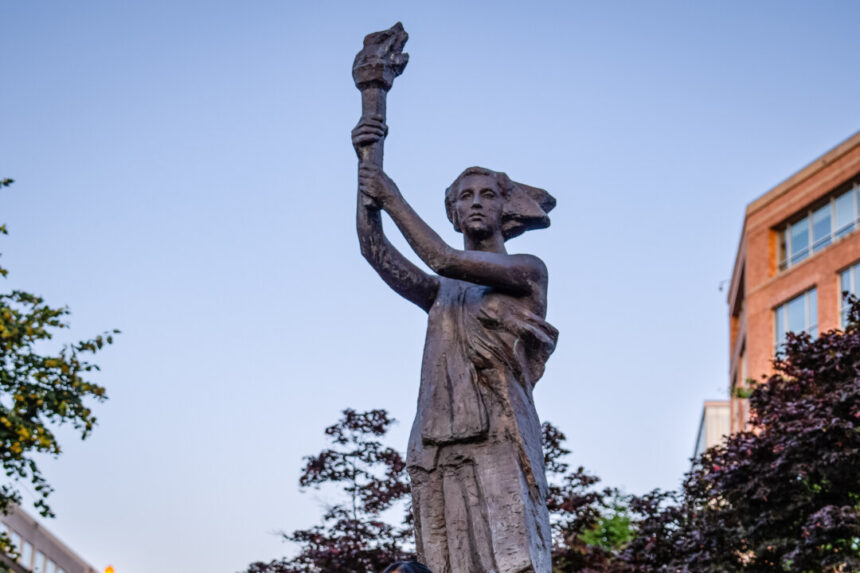Commentary
Near Atlanta, on a spring day in 1990, I was outside, underneath a large tent with dozens of others seated at tables, each facing a telephone.
I was six years old and when the call connected to a boy on the other end of the phone who sounded like he was my age.
I had no other concept of who he was. I wasn’t sure what to ask him, but knew something important was happening because my parents were very excited.
I learned the boy on the other side of the phone was from East Berlin. He spoke English with an accent, yet I could understand him clearly.
Perhaps with some coaching, I asked him, “What’s different now where you live?”
“We can visit our family on the other side of the city,” he answered.
Many alive today have no more sense than I did at six, how this—and a thousand other lost opportunities, dehumanizing degradations, and unimaginable injustices—shaped our world at communism’s peak. Decades after the fall of the Berlin Wall and the collapse of communism in Europe, many regard those events as distant history — if they even remember them at all. But the spirit of authoritarian control haunts us still, ready to overtake us if we fail to defend our liberty from, as the Nobel laureate F.A. Hayek called them in his dedication to The Road to Serfdom, “the socialists of all parties.”
Everyone’s a Victim
Reflecting on the tyranny of communist rule, we often think of the large-scale horrors: forced starvations, prison camps, and summary executions.
This legitimate focus on deaths means we neglect the smaller yet compounding consequences of the state’s command and control over every detail of life, which affect generations in ways we’ll never fully understand.
In the 1950s in Poland, my grandfather, a bridle maker, was interrogated with a bright light in his face for the crime of buying a piece of leather from a nearby town. My grandmother had to hitchhike to the prison to retrieve him, after which they began planning to leave the only home they had known to start a better life in the United States. There was no way for them to live a peaceful and fulfilling life in Poland without joining the Communist Party they despised.
Tell a high school student with a Che Guavara sticker on her MacBook that she can’t have a car and she may second guess her choice of political idol. That is if she hasn’t already heard about the hundreds of people he executed.
Communism’s True Nature
The superficial allure of communism is eradicating poverty by placing all members of society on an equal material footing.
But the devil is in the details. Karl Marx’s Communist Manifesto explained clearly how this would be achieved: “The theory of the Communists may be summed up in the single sentence: Abolition of private property.”
Communism, however, is so much more repressive than the government merely stealing a person’s property.
To accomplish their aims, communist states must break the natural ways that people think and behave, then attempt to retrofit anti-social behaviors in their place.
Among these goals and tactics are forced association—for example, by limiting access to cars to only those who join the Communist Party, or by outlawing competing social institutions such as the Church.
Not only was private property outlawed, but, as my grandfather discovered, so was trade at even the smallest scale.
As economist Ronald Coase differentiated importantly, “The law of property determines who owns something, but the market determines how it will be used.”
Generations of Devastation
In failing to confront evil, in burying it deep within ourselves, we unknowingly sow the seeds for its resurgence in the future. This is the tragic legacy of communism, a system that thrives on control and oppression.
Under communist rule, individuals are stripped of their freedom and forced to conform to the state’s mandates. Those who resist often pay with their lives, leaving behind a legacy of fear and surveillance for future generations.
Even those who escape physical harm are not spared from the mental and emotional toll of living under communism. The constant pressure to conform and surrender personal autonomy erodes the very fabric of society, turning individuals into mere pawns of the state.
Communism does not bring liberation—it brings control. It dictates every aspect of a person’s life, from what they can do to what they can think. Those who do not conform are labeled as threats and subjected to punishment.
The victims of communism are not just those who lost their lives, but also those who were marginalized and oppressed for their beliefs or identities. Entire societies have been driven to madness in the pursuit of utopian ideals, sacrificing individuality for the greater good.
As Václav Havel, a poet and former political prisoner, once said, “The tragedy of modern man is not that he knows less about the meaning of his own life, but that it bothers him less.” This indifference to the erosion of humanity is the true legacy of communism.
Despite the fall of the Berlin Wall in 1989, the remnants of communism still linger, shaping our world in ways both subtle and profound. It is up to us to learn from the past and ensure that such oppressive ideologies never take hold again.
Richard N. Lorenc is president & COO at Certell, which provides world-class engaging digital curricula in the social studies to teachers, at no charge, for in-person learning. From the American Institute for Economic Research (AIER)
Views expressed in this article are opinions of the author and do not necessarily reflect the views of The Epoch Times.
Please rephrase this sentence.
Source link








